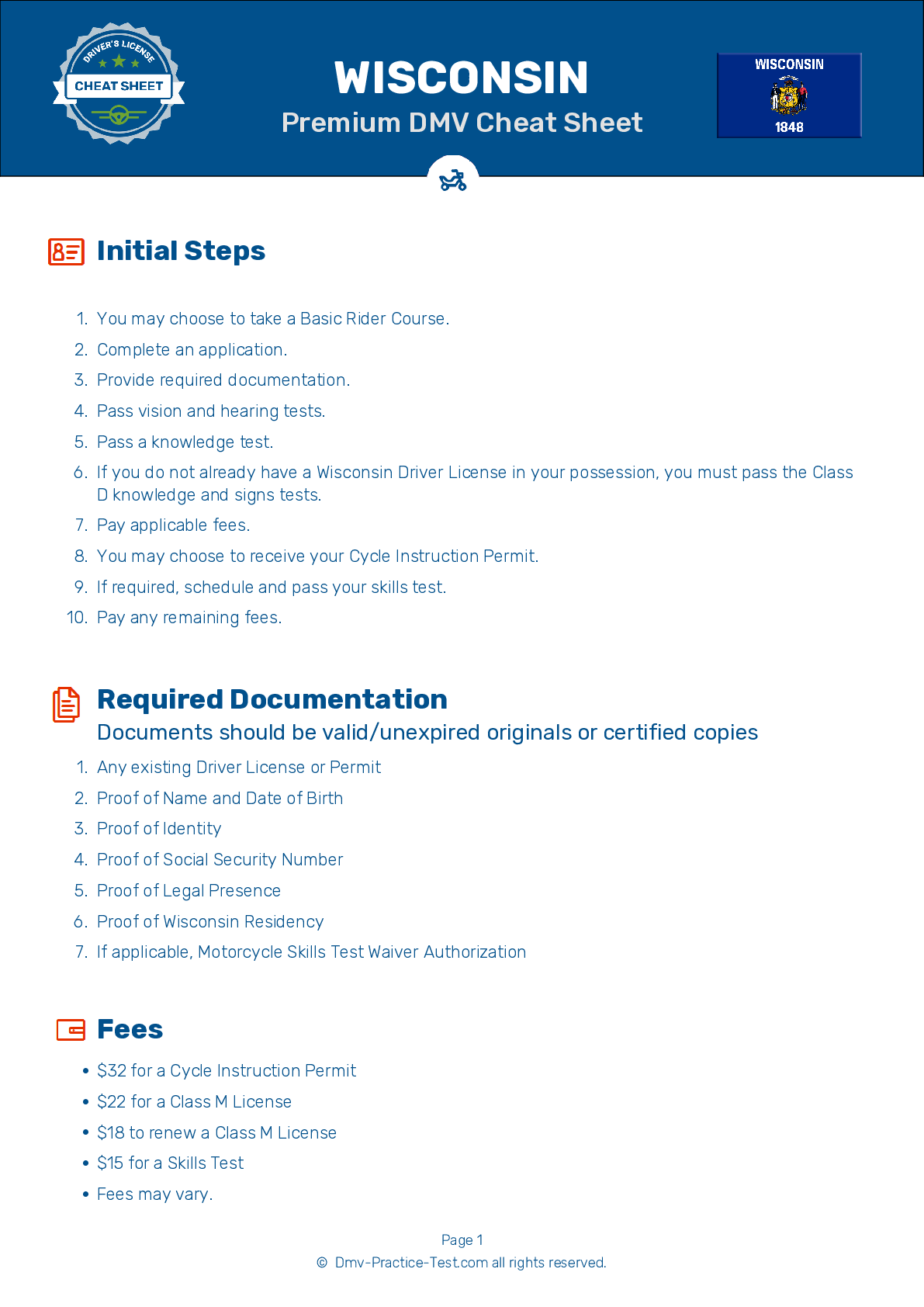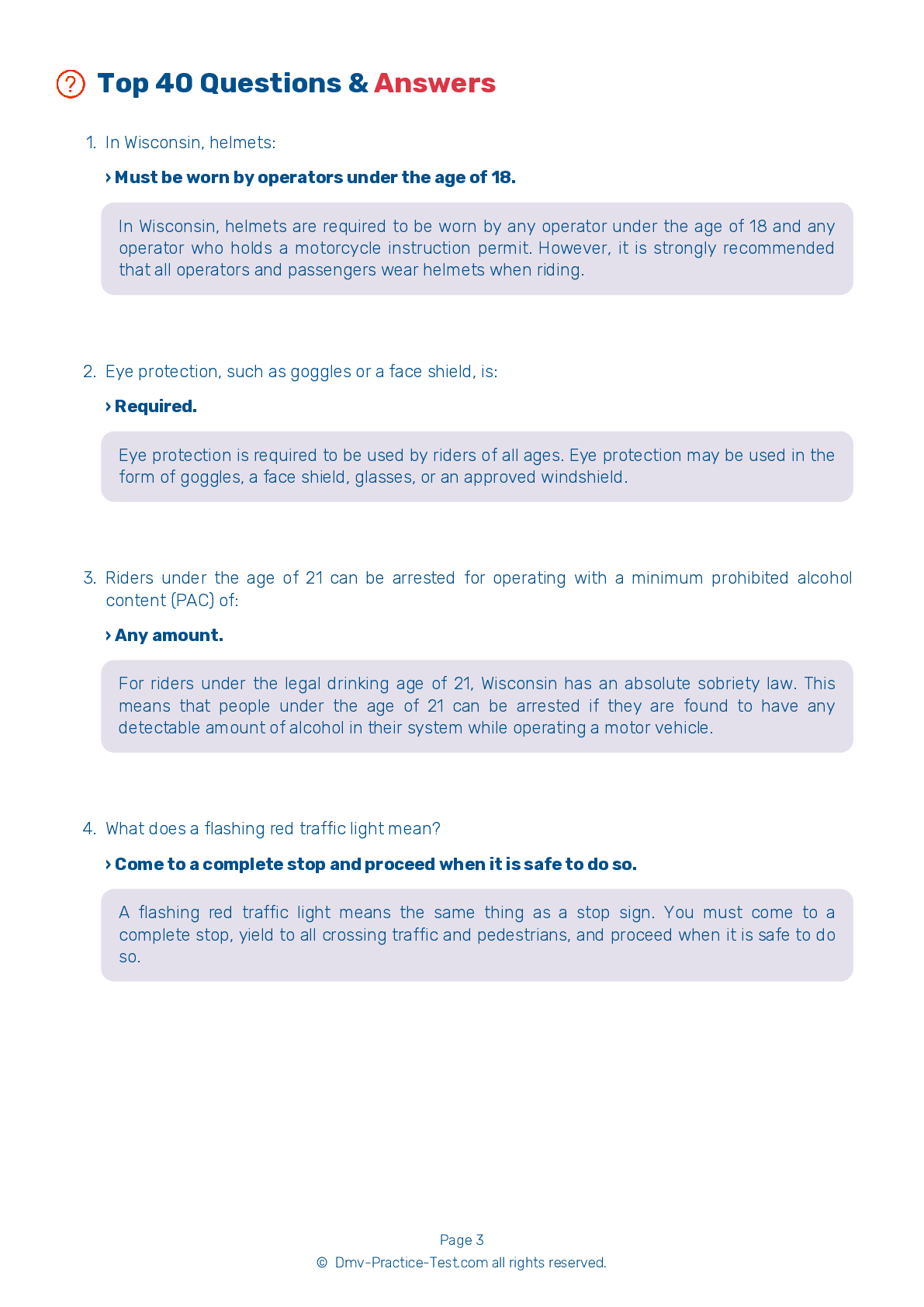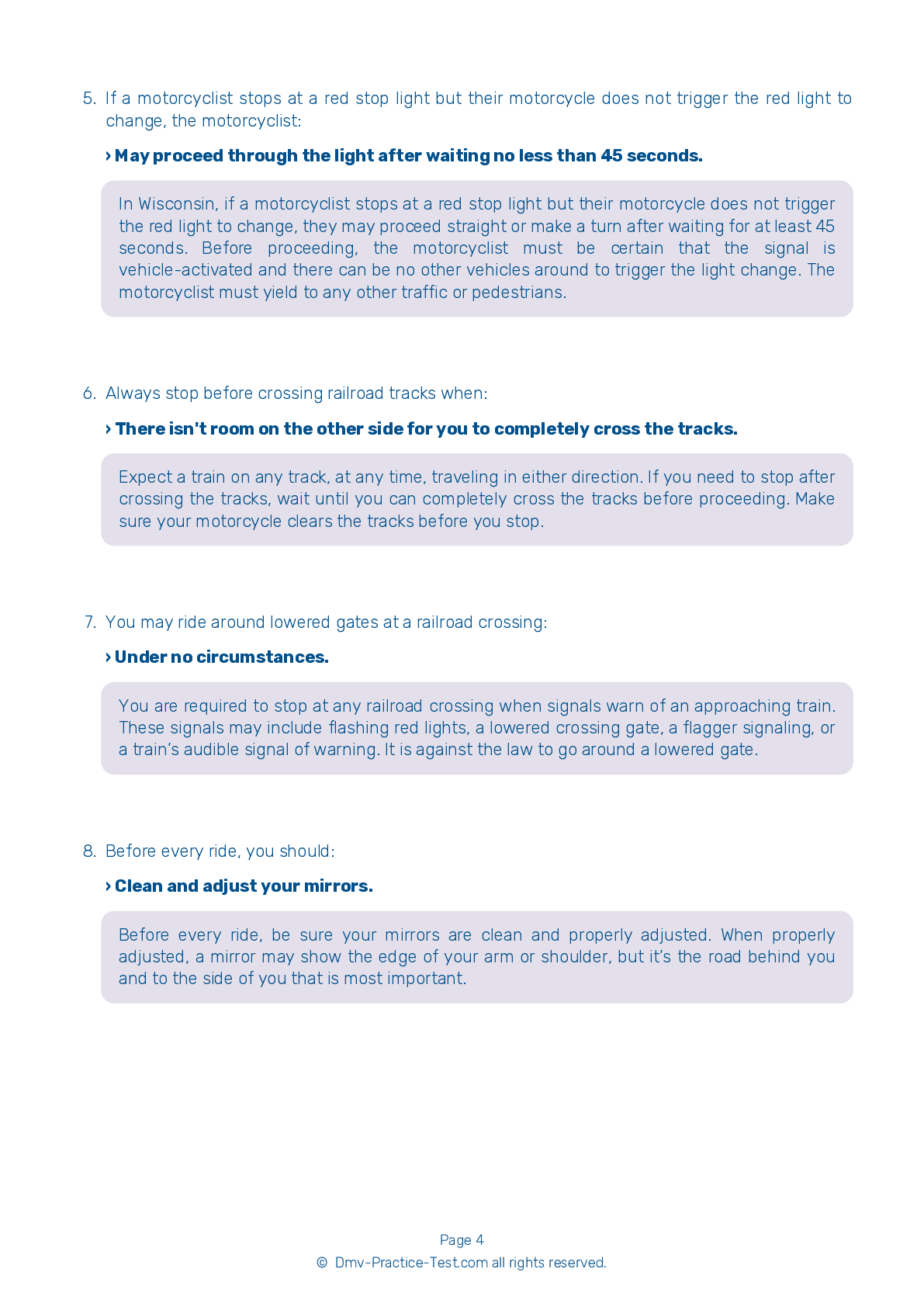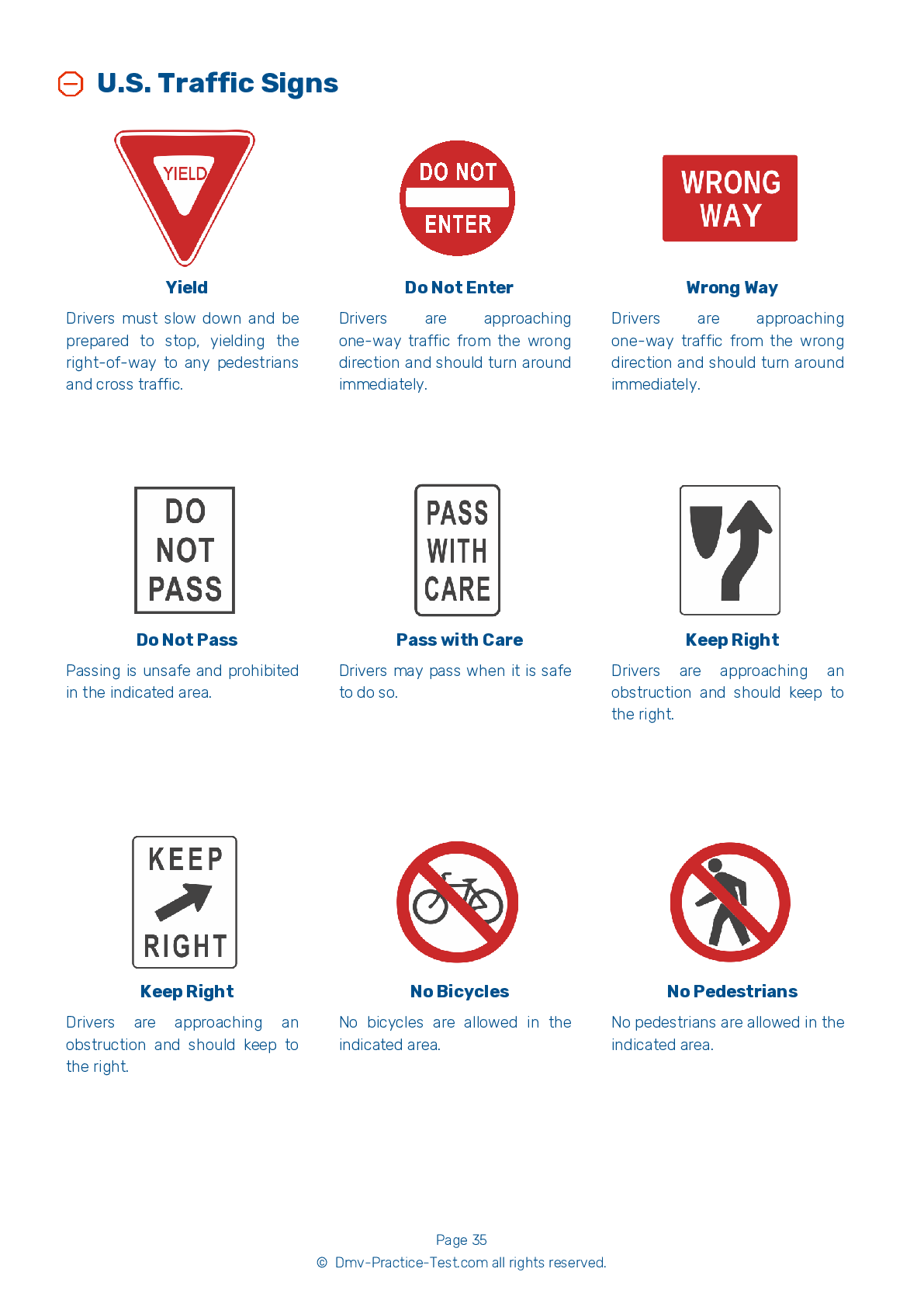DMV Permit Test #5
Motorcycle Test | License WI 2026 | FREE Online Practice! #5 Page 5 of 5
Take this FREE motorcycle test (license in WI 2026) to check your knowledge of the road rules. To improve your results, download a motorcycle handbook online, study theory, and practice for free on our website. Still worried about how to get a motorcycle license in Wisconsin in 2026? Check our website for more sample tests, train as much as possible, and boost your grades!
40
35
16
33 . When braking, you should:
Only use the rear brake.
Use both brakes every time you slow or stop, regardless of the condition of the road.
34 . When scanning the area around your motorcycle, you should:
While searching the road for potential hazards, focus on looking for escape routes in or around intersections, shopping areas, schools, and construction zones.
35 . Shifting to a lower gear produces an effect similar to:
Turning.
Most motorcycles have a manual transmission. Downshifting to a lower gear will slow you down.
36 . Motorcyclists riding in a group should avoid pairing up because:
It is too difficult for riders on the left side of a pairing to exit a highway.
When traveling in a group, it is never recommended for motorcyclists to ride in pairs. Neither rider will have adequate room to maneuver to avoid hazards.
37 . If your drive chain breaks, you:
If your chain breaks while you are riding, you will notice an instant loss of power to the rear wheel. Close the throttle and brake to a stop.
38 . Studies show that when motorcycles have their headlights turned on during the day:
They are less safe than when their headlights are turned off.
The best way to help other drivers see your motorcycle is to keep your headlight on whenever you ride. During the day, a motorcycle with its headlight on is twice as likely to be noticed.
39 . A DOT-compliant helmet has all of the following, except:
Bright colors painted on the outside.
Any U.S. Department of Transportation-compliant helmet is required to have an impact-resistant outer shell, an impact-absorbing inner liner, a comfort liner, and a chinstrap retention system.
40 . This sign means:
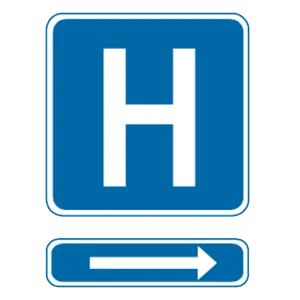
Hospital ahead and to the right.
This sign indicates that hospital emergency services are located to the right.
2026 Wisconsin | Frequently Asked Questions
To get a motorcycle license in Wisconsin, you must first obtain a motorcycle instruction permit by passing a written test. After practicing with the permit for at least 30 days, you can take a skills test to get your motorcycle license. Alternatively, completion of a Wisconsin Motorcycle Safety Program course can waive the skills test requirement. Applicants must be at least 16 and have parental consent if under 18.
In Wisconsin, the minimum age for obtaining a motorcycle driver's license is 16. However, riders under 18 must also complete a basic motorcycle rider course approved by the Department of Transportation and hold a motorcycle instruction permit for at least six months before obtaining the license. Parental consent is also required for riders under 18.
Yes, in Wisconsin, you need a dedicated motorcycle license or a motorcycle endorsement on your regular driver's license to legally ride a motorcycle. This typically involves passing a written test and a skills test. If you don't have a motorcycle license, you could face penalties such as fines or even suspension of your driving privileges.
To apply for a motorcycle license in Wisconsin, you'll need to provide proof of your name and date of birth (like a valid passport or birth certificate), proof of identity (like a valid driver's license), proof of Wisconsin residency (like a utility bill or lease agreement), and your social security number. If you're under 18, parental consent is also required. Always check with WisDOT for the most current requirements.
Yes, in Wisconsin, you will need to take a written exam for your motorcycle license. The exam covers various topics such as motorcycle operation, safety rules, handling dangerous surfaces, carrying passengers and cargo, and group riding. The test ensures you understand the rules and safety measures necessary for operating a motorcycle. However, completing a Basic Rider Course can waive this requirement.
The motorcycle written test in Wisconsin covers a variety of topics related to motorcycle operation and safety. This includes understanding traffic signs and signals, rules of the road, safe riding techniques, handling dangerous surfaces, carrying passengers or cargo, and dealing with mechanical problems. All this information can be found in the Wisconsin Motorcyclists' Handbook.
Yes, in Wisconsin, you can substitute the written test with a motorcycle training course. If you successfully complete a Wisconsin Motorcycle Safety Program Basic Rider Course, the skills test and the written test may be waived when applying for your motorcycle license at the Wisconsin Department of Transportation (WisDOT). Always check with WisDOT for current rules and regulations.
To enroll in a motorcycle training course in Wisconsin, first find a state-approved program such as the Wisconsin Motorcycle Safety Program. Register either online or by phone, depending on the program's process. The course typically includes classroom instruction and hands-on training. Completion of the course often allows you to bypass the DMV's skills test for motorcycle licensure.
No, you don't have to own the motorcycle you use for the Wisconsin license test. However, the motorcycle you use must be street-legal, properly insured, and registered. If the motorcycle isn't registered in your name, you'll need written permission from the owner to use it for the test. It must also meet all Department of Transportation requirements.
Yes, you can use a friend's motorcycle for your Wisconsin driver's license evaluation. However, the motorcycle must be street-legal, registered, and insured. Also, you must have written permission from the owner if the motorcycle is not registered in your name. Be sure to comply with all Wisconsin Department of Transportation rules and regulations during the test.
Yes, during the Wisconsin motorcycle driving exam, specific handling skills are tested. These include starting and stopping, turning and swerving, and quick stops. The test also assesses your ability to balance at low speeds, make normal and fast stops, and execute normal and sharp turns. These skills ensure you can safely operate a motorcycle on the state's roads.
Yes, new motorcycle drivers in Wisconsin who are issued an instructional permit are subject to certain limitations. They're not allowed to carry passengers, ride at night, or ride on any expressway or freeway. These restrictions are lifted once the rider successfully completes a motorcycle driving test and receives a full motorcycle endorsement.
Yes, your Wisconsin motorcycle license or endorsement allows you to operate a motorcycle in other states. However, you must abide by the traffic laws of each state you're in. It's also important to note that some states have helmet laws that may differ from Wisconsin's, so be sure to check those before riding out of state.
In Wisconsin, helmet laws are age-specific. All riders under the age of 18 and those with a learner's permit, regardless of age, are required to wear a helmet. However, adult riders over 18 are not legally required to wear a helmet. Despite this, it's recommended for safety reasons to always wear a helmet when operating a motorcycle.
In Wisconsin, there are two types of motorcycle licenses: a motorcycle-only license and a motorcycle endorsement. The motorcycle-only license allows you to operate only a motorcycle. A motorcycle endorsement can be added to a regular driver's license, permitting you to drive both cars and motorcycles. Both require passing written and skills tests.
Yes, in Wisconsin, you can add supplementary endorsements to your motorcycle license. These might include a commercial driver's license (CDL) or a school bus endorsement. Each endorsement requires additional testing and fees. Be sure to check with your local DMV or the Wisconsin Department of Transportation for specific details and requirements.
Yes, the Wisconsin Department of Transportation provides the motorcycle license test in several languages other than English. These include Spanish, Chinese, Polish, Russian, and more. It's advised to contact your local DMV service center beforehand to confirm the availability of the test in your preferred language.
A successful strategy to prepare for the Wisconsin motorcycle license test includes studying the Wisconsin Motorcyclists' Handbook thoroughly, taking practice tests available online or through DMV-approved apps, and understanding all road signs and signals. Additionally, gaining practical experience through a motorcycle safety course can be very beneficial.
Yes, the Wisconsin Department of Transportation offers the motorcycle written exam in multiple languages other than English. These include Spanish, Chinese, Polish, Russian, among others. However, it's recommended to contact your local DMV service center in advance to confirm the availability of the test in your preferred language.
If you fail the motorcycle written test in Wisconsin, you are allowed to retake it. However, you must wait one day before attempting the test again. It's important to review the Wisconsin Motorcyclists' Handbook and understand the concepts before retaking the test. There may be a re-examination fee depending on how many times you've failed the test.
